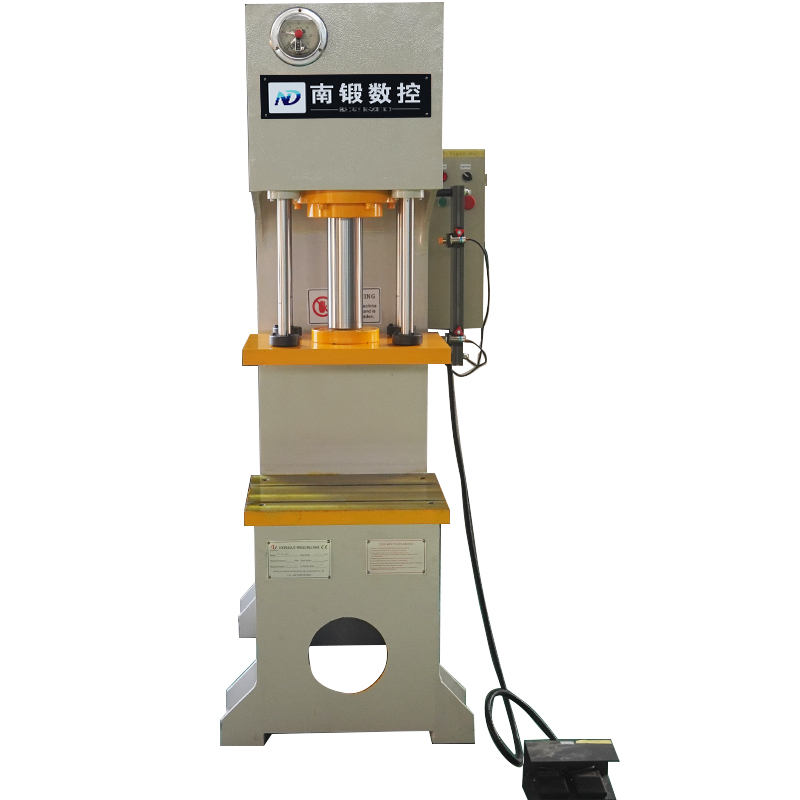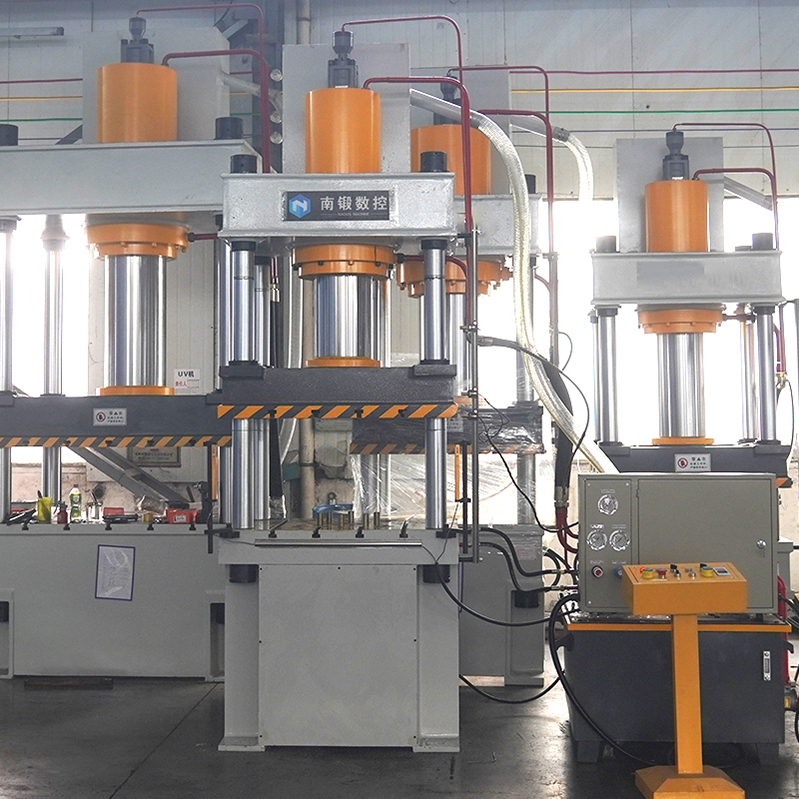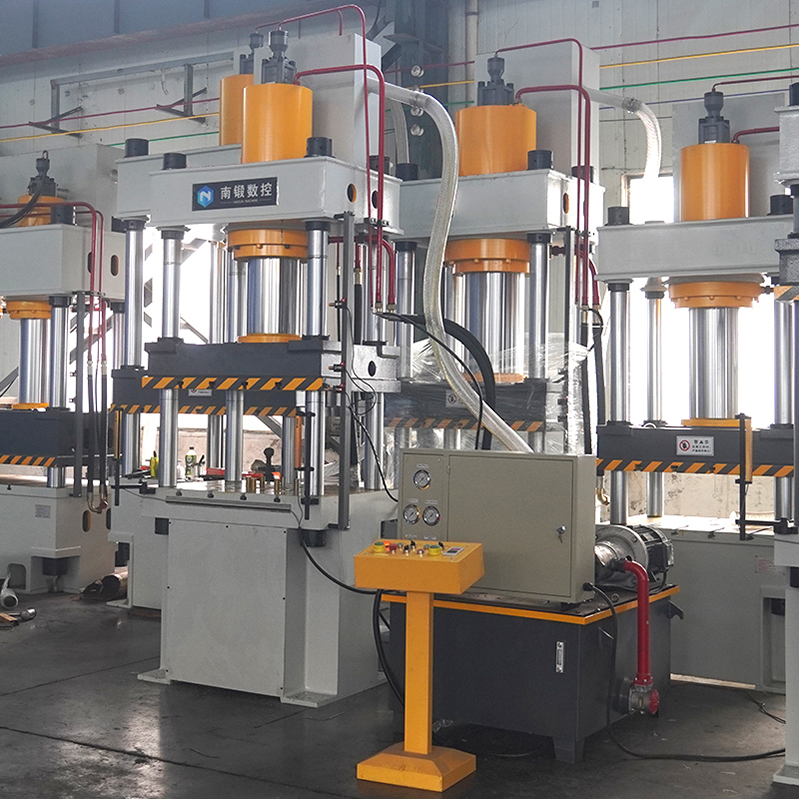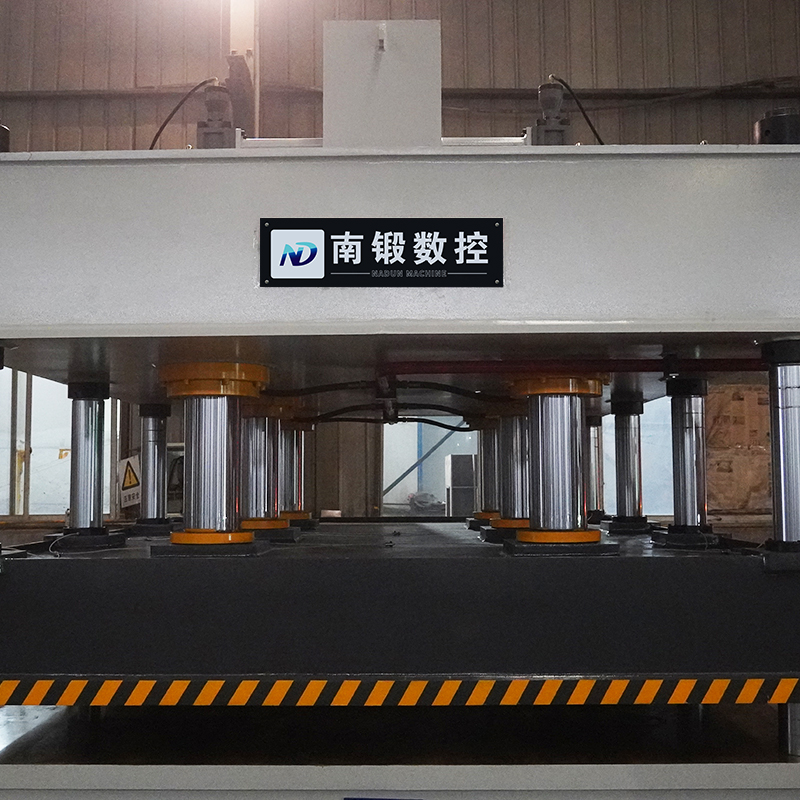
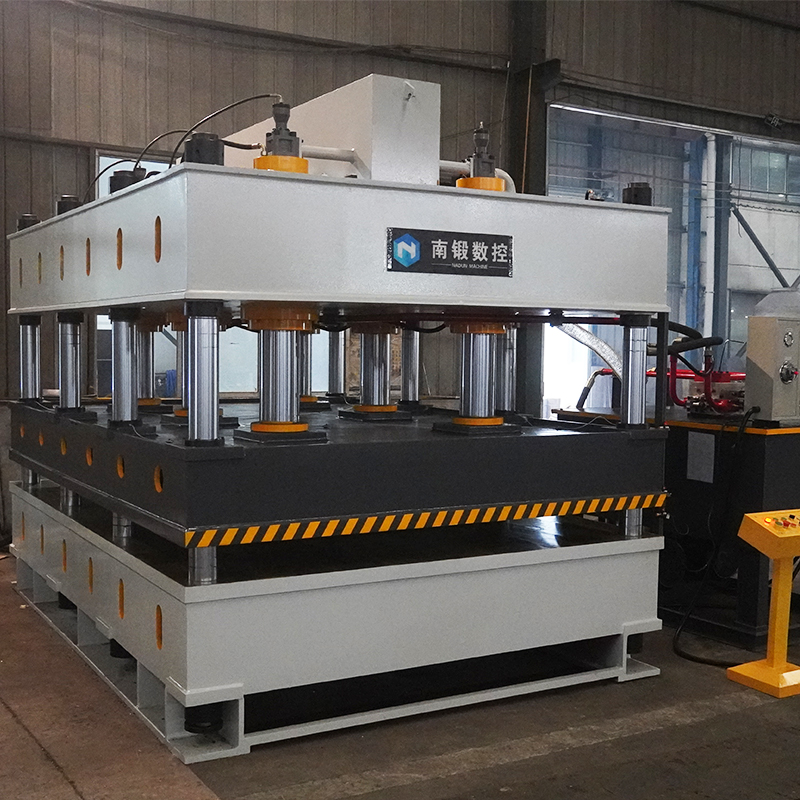


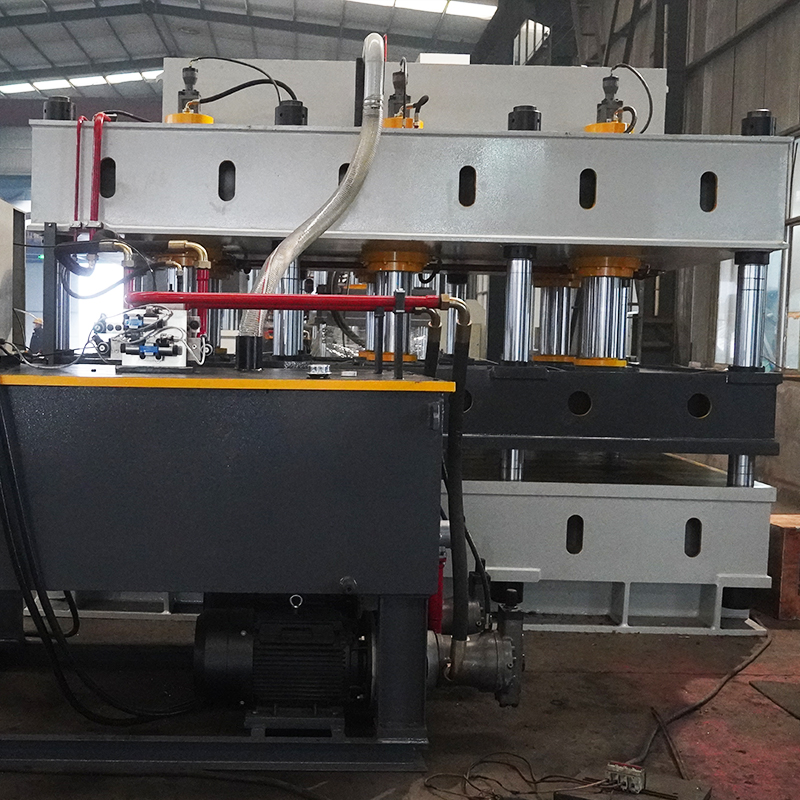



500-Ton CNC Vertical Hydraulic Press Eight-Column Large-Scale Press, Full Range of Tonnage
Model: YQ32-315T
Basic Info.Model NO.YQ32-500TConditionNewAfter-sales ServiceEngineers Available to Service Machinery OverseasSystem Pressure25MPaEffective Worktable1400*1400mmStroke900mmOpening1500mmDown Speed140mm/S
Get More Information
Product Description
Basic Info.
Packaging & Delivery
Product Description
| SPECIFICATION | UNIT | YQ32-400T | YQ32-500T | YQ32-630T | YQ32-800T | YQ32-1000T | YQ32-1250T | YQ32-1600T |
| Nominal force | KN | 4000 | 5000 | 6300 | 8000 | 10000 | 12500 | 16000 |
| Max.System pressure | Mpa | 25 | 25 | 25 | 25 | 25 | 25 | 25 |
| Max.Open heigh | mm | 1250 | 1500 | 1500 | 1800 | 1600 | 1600 | 1800 |
| Max.Stroke of slider | mm | 800 | 900 | 900 | 1000 | 900 | 900 | 1000 |
| Effective table size | mm | 1260x1160 | 1400x1400 | 1600x1600 | 1500x1500 | 1500x1500 | 1800x1600 | 1600x1600 |
| Down speed | mm/s | 100 | 100 | 80 | 80 | 80 | 80 | 80 |
| Pressings pee | mm/s | 5-9 | 8-15 | 6-12 | 8-17 | 6-13 | 7-15 | 8-17 |
| Return speed | mm/s | 55 | 70 | 60 | 70 | 70 | 70 | 70 |
| Ejection cylinder force | KN | 630 | 1000 | 1000 | 1000 | 1000 | 1000 | 1600 |
| Stroke of ejectioncylinder | mm | 300 | 300 | 300 | 350 | 350 | 350 | 350 |

Nadun Machinery Manufacture Co., Ltd. presents the 500-ton Large Table Hydraulic Press, a robust machine engineered for high-force applications. Featuring a six-cylinder setup and eight-pillar support, this press guarantees stability and precision throughout its operation. Its expansive table surface accommodates large materials, making it an ideal solution for demanding industrial processes. Trusted across automotive, aerospace, and heavy equipment manufacturing sectors, this hydraulic press endures continuous use with unwavering performance. Our dedication to quality and customer contentment ensures each press delivers unparalleled accuracy and reliability.
 In hydraulic machinery, the function of a stroke control switch is to manage and regulate the movement of the ram or cylinder within a specified range. This switch ensures precise control over the stroke length, allowing for consistent and accurate operation. The stroke control switch is crucial for applications that require repetitive and exact movements, such as pressing, forming, or cutting operations. It helps improve productivity and maintain the quality of the output by eliminating human error and ensuring that each cycle of the machine performs the desired action within the predetermined parameters.
In hydraulic machinery, the function of a stroke control switch is to manage and regulate the movement of the ram or cylinder within a specified range. This switch ensures precise control over the stroke length, allowing for consistent and accurate operation. The stroke control switch is crucial for applications that require repetitive and exact movements, such as pressing, forming, or cutting operations. It helps improve productivity and maintain the quality of the output by eliminating human error and ensuring that each cycle of the machine performs the desired action within the predetermined parameters. Label 1 is the system pressure gauge, and label 2 is the main cylinder pressure gauge.
Label 1 is the system pressure gauge, and label 2 is the main cylinder pressure gauge.Hydraulic equipment relies on a pressure gauge to gauge the current pressure of the fluid within the system. Its main role is to furnish operators with essential data to verify the machine's adherence to the specified pressure limits. This aids in upholding both efficiency and safety by averting overpressurization, a potential cause of part failure or harm, and confirming adequate pressure for task execution. Pressure gauges are indispensable for overseeing and diagnosing hydraulic setups, facilitating prompt action and upkeep to forestall unanticipated halts and elongate equipment longevity.
 In hydraulic machinery, a Programmable Logic Controller (PLC) is used to automate and control the operation of the machine by managing the sequence and timing of hydraulic circuits. It enhances productivity, precision, and safety by replacing manual controls with a programmable system that can be easily adjusted and monitored.
In hydraulic machinery, a Programmable Logic Controller (PLC) is used to automate and control the operation of the machine by managing the sequence and timing of hydraulic circuits. It enhances productivity, precision, and safety by replacing manual controls with a programmable system that can be easily adjusted and monitored. Integrated cartridge valves in hydraulic machinery are used to control the flow and pressure of hydraulic fluid within the system, providing efficient and compact solutions for various hydraulic functions.
Integrated cartridge valves in hydraulic machinery are used to control the flow and pressure of hydraulic fluid within the system, providing efficient and compact solutions for various hydraulic functions. Two standard motors, with more optimized pricing. Or if you have environmental requirements, you can also opt for servo motors.
Two standard motors, with more optimized pricing. Or if you have environmental requirements, you can also opt for servo motors. The mobile operating station in hydraulic machinery is used to provide a convenient and portable interface for operators to control and monitor the machine's functions from various positions around the equipment.
The mobile operating station in hydraulic machinery is used to provide a convenient and portable interface for operators to control and monitor the machine's functions from various positions around the equipment.




1. Could I obtain the required documentation?
Certainly, we offer a variety of documents, including Certificates of Analysis/Conformance, insurance particulars, certificates of origin, and other essential export paperwork.
2. What's the typical lead time?
Our standard lead time ranges from approximately 30 days for samples to between 30 and 60 days for mass production post-deposit payment. Commencement of lead times is upon deposit receipt and final product confirmation. If our lead times don't align with your schedule, please discuss it with your designated sales representative. We strive to accommodate your requirements whenever feasible.
3. What payment methods do you accept?
We accommodate payments through bank transfers, Western Union, or PayPal. Our usual payment terms entail a 30% initial deposit, with the balance of 70% due upon presentation of the bill of lading copy.
4. What does the product warranty cover?
We guarantee the quality of our materials and craftsmanship. Beyond the warranty period, we endeavor to address and rectify any issues to ensure customer satisfaction.
5. Can you ensure secure product transport?
Absolutely, we employ sturdy export packaging to ensure secure delivery. We utilize specialized packaging for hazardous materials and utilize certified cold chain shippers for temperature-controlled items. However, any unique packaging requirements may result in additional costs.
6. How are shipping expenses determined?
Shipping costs are contingent upon the selected delivery method. Express shipping is quicker but more costly, whereas sea freight is often preferable for larger orders. We can furnish precise freight quotations once we have specifics of your order, such as quantity, weight, and your preferred shipping method. Please feel free to reach out to us for further clarification.
Watch our hydraulic press machine in action. This video demonstrates the operation process and key features.
Technical Specifications
| Item | Parameter |
|---|---|
| Model | YQ32-315T |
| Rated Pressure | 315 Tons |
| Slide Stroke | 500mm |
| Max. Open Height | 1000mm |
| Table Size | 1400×1300mm |
| Motor Power | 15KW |
| Dimensions | 2500×1800×3000mm |
| Weight | Approx. 12,000kg |
Technological Process
-
Material Preparation
Prepare metal sheets or blanks according to product requirements.
-
Loading
Place the material on the work table in correct position.
-
Positioning
Use positioning devices to ensure material is properly aligned.
-
Pressing
Start the hydraulic system to perform the pressing operation.
-
Unloading
Remove the formed product from the machine.
-
Quality Check
Inspect the product dimensions and surface quality.
Application Cases

Automotive Parts Manufacturing
Used in producing car body panels with high precision and efficiency.

Appliance Components
Manufacturing of washing machine panels and refrigerator parts.

Hardware Products
Production of various metal hardware products and tools.

